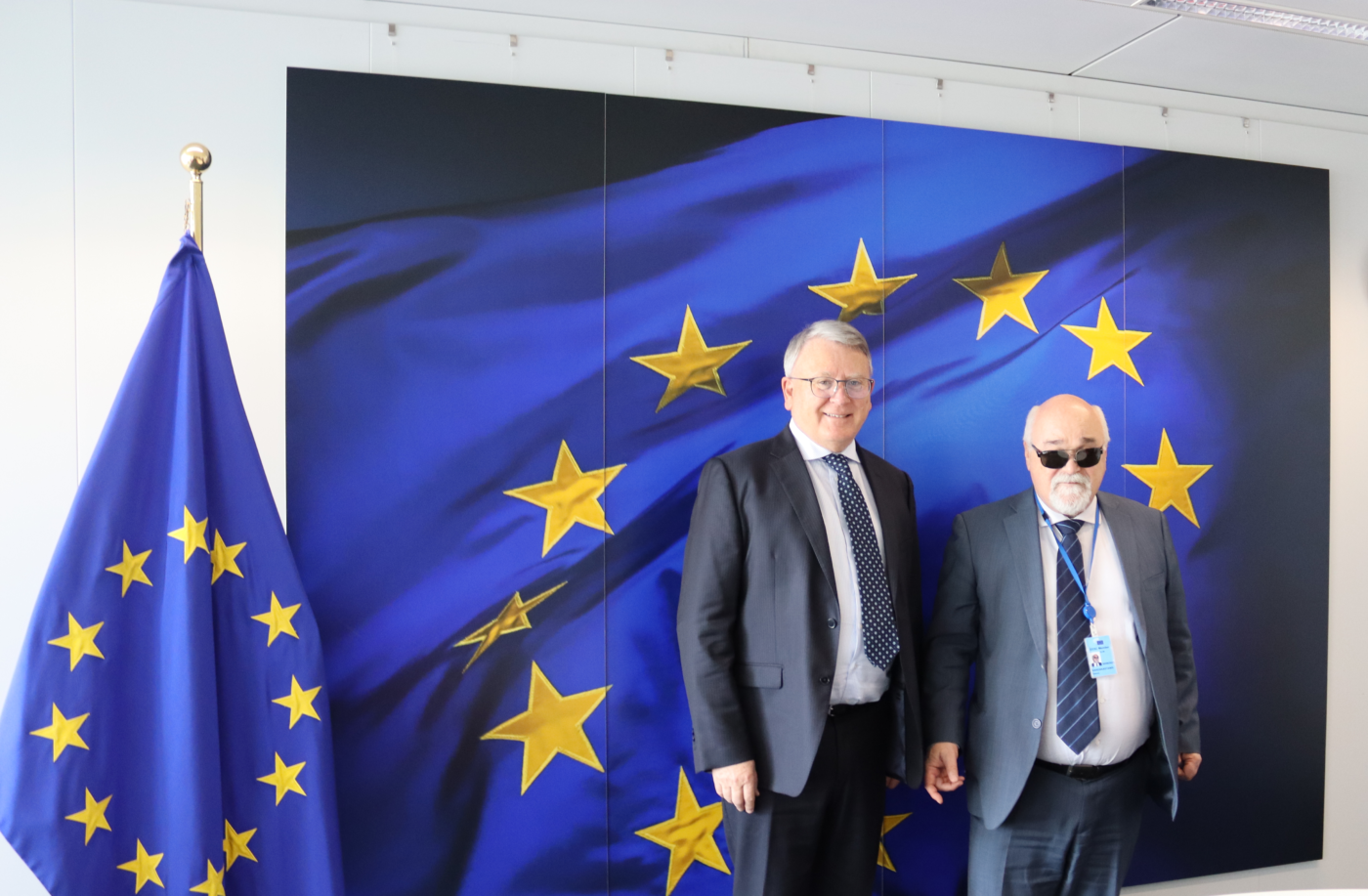Featured image – copyright: European Union, 2023
On 28 March 2023, a delegation of the European Disability Forum led by President Yannis Vardakastanis met European Commissioner for Jobs and Social Rights, Nicolas Schmit. The meeting served to exchange views on initiatives concerning employment and social inclusion of persons with disabilities.
The discussion highlighted that – despite progress made in Europe in implementing the UN Convention on the Rights of Persons with Disabilities – statistics show that employment rates of persons with disabilities are still persistently low, and poverty rates continue to be high. Furthermore, barriers to employment were debated, with delegations pointing out that our social protection systems are not flexible enough; that education, training and skills development are not inclusive enough; that there is a lack of support to access quality employment; other factors such as persistent stereotypes and inaccessibility also create severe difficulties for persons with disabilities.
Specific topics included:
- The need for a “Disability Employment and Skills Guarantee” in line with the successful Youth Guarantee. This EU instrument would provide funding and support to ensure that persons with disabilities have equal access to mainstream education, training and employment opportunities. The guarantee can also support in making every training and skills development programmes fully inclusive and accessible.
- The need to stop the use of any EU funds from financing segregating institutional settings – including refurbishment and maintenance of these settings.
- The importance of disability-related support – which compensates for the extra costs related to disability and should not be tied to employment status or other sources of income.
- Access to quality employment, with equal remuneration, for persons with disabilities.
- The importance of bridging the skills gap, especially regarding digital skills and all other skills relevant to inclusion in the open labour market.
- How to ensure all persons with disabilities can receive the support they need in their private lives and at work, including workplace adjustments, sign language interpretation, personal assistance and other types of support – which are often known as reasonable accommodation. The EDF delegation praised the initiative for an upcoming guidance from the EU on reasonable accommodation.
- The EDF delegation expressed its satisfaction with the increasing attention given to persons with disabilities in the EU Semester process but outlined the need for it to be used for the continuous improvement of the social and economic situation of persons with disabilities (through recommendations on education, training, employment, social protection, person-centred community services, and others)

The delegations also discussed the conclusions of EDF’s upcoming Human Rights Report on the employment situation of persons with disabilities in Europe, which will be launched in late April. The report highlights that:
- Only 51.3% of people with disabilities are employed, compared to 75.6% of people without disabilities. For women and for young people with disabilities, the figure is even lower – 49% for the former and 47.4% for the latter.
- There is a very clear disability pay gap. Women with disabilities have a lower annual income than men with disabilities, and persons with disabilities have considerably lower income than persons without disabilities. (while, as said earlier, experiencing much higher costs of living due to inaccessibility and high costs for support)
- Despite the existence of an EU directive on non-discrimination in employment, many persons with disabilities are still discriminated against in recruitment, in employment and when it comes to their right to reasonable accommodation at work.
Yannis Vardakastanis, President of the European Disability Forum, stated:
We need to be tougher on fighting the discrimination that many persons with disabilities face both before and during employment. That is why I proposed to Commissioner Schmit the Disability Employment Guarantee – an initiative that can offer greater and more tailored support to persons with disabilities that want to work. We also discussed the need to ensure equal access – and proper support – for persons with disabilities to education, training and initiatives that develop their skills, including digital skills.
European Commissioner for Jobs and Social Rights, Nicolas Schmit, said:
We need to work more on giving persons with disabilities all opportunities to get trained and find a job that suits their skills and aspirations. There are many good practices in different Member States that we can take inspiration from for example on how to make the public employment services more geared to the needs of persons with disabilities and how to accompany companies that employ persons with disabilities.